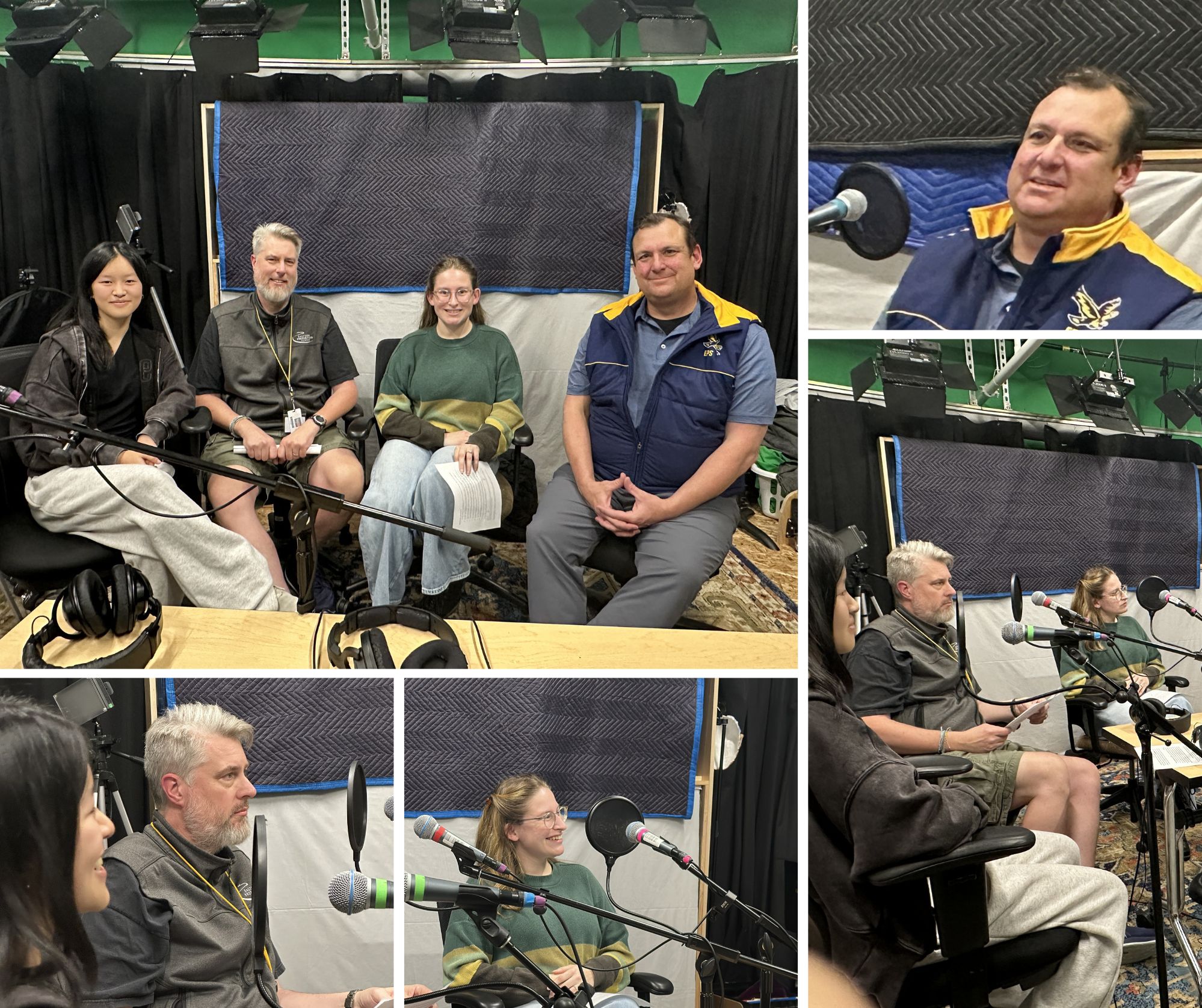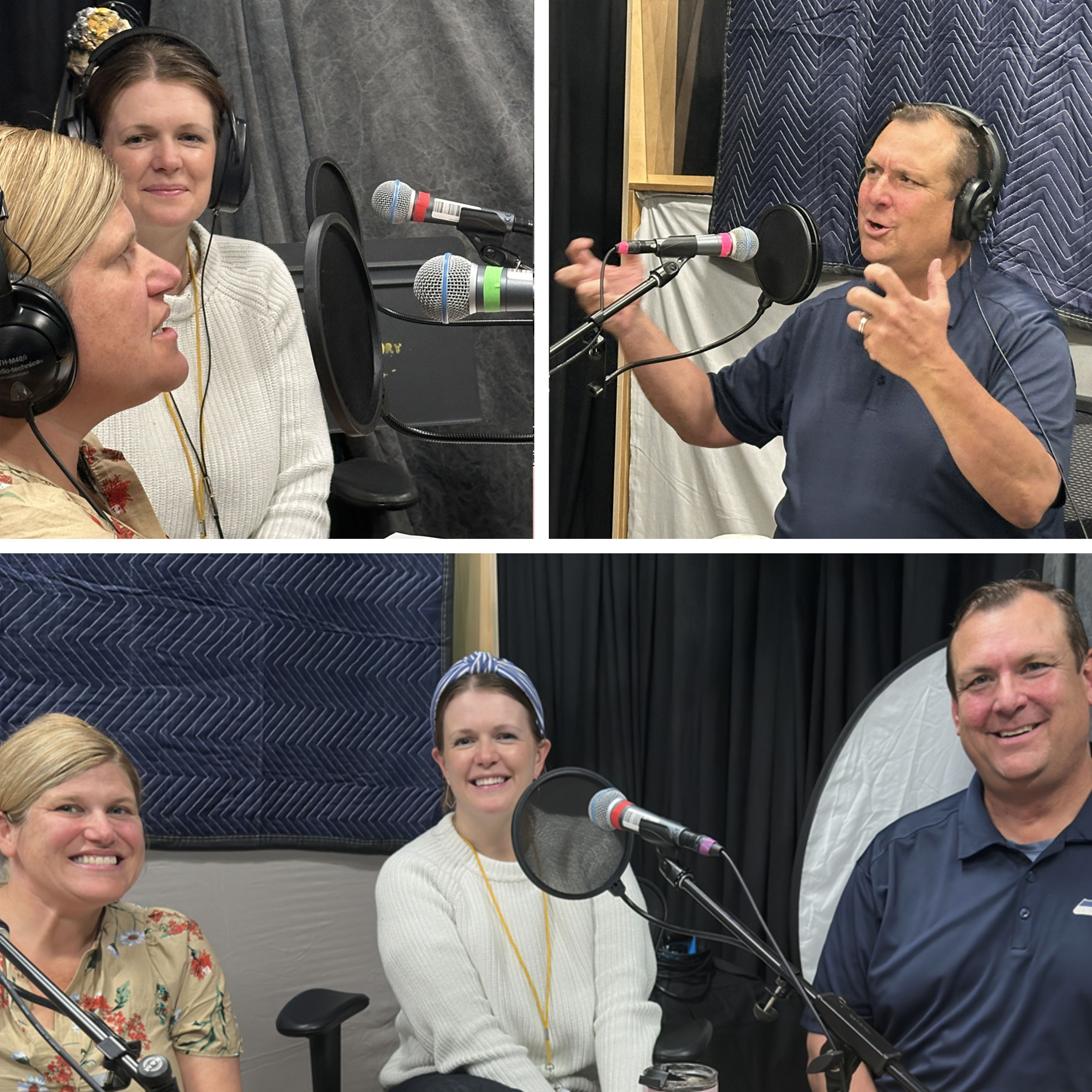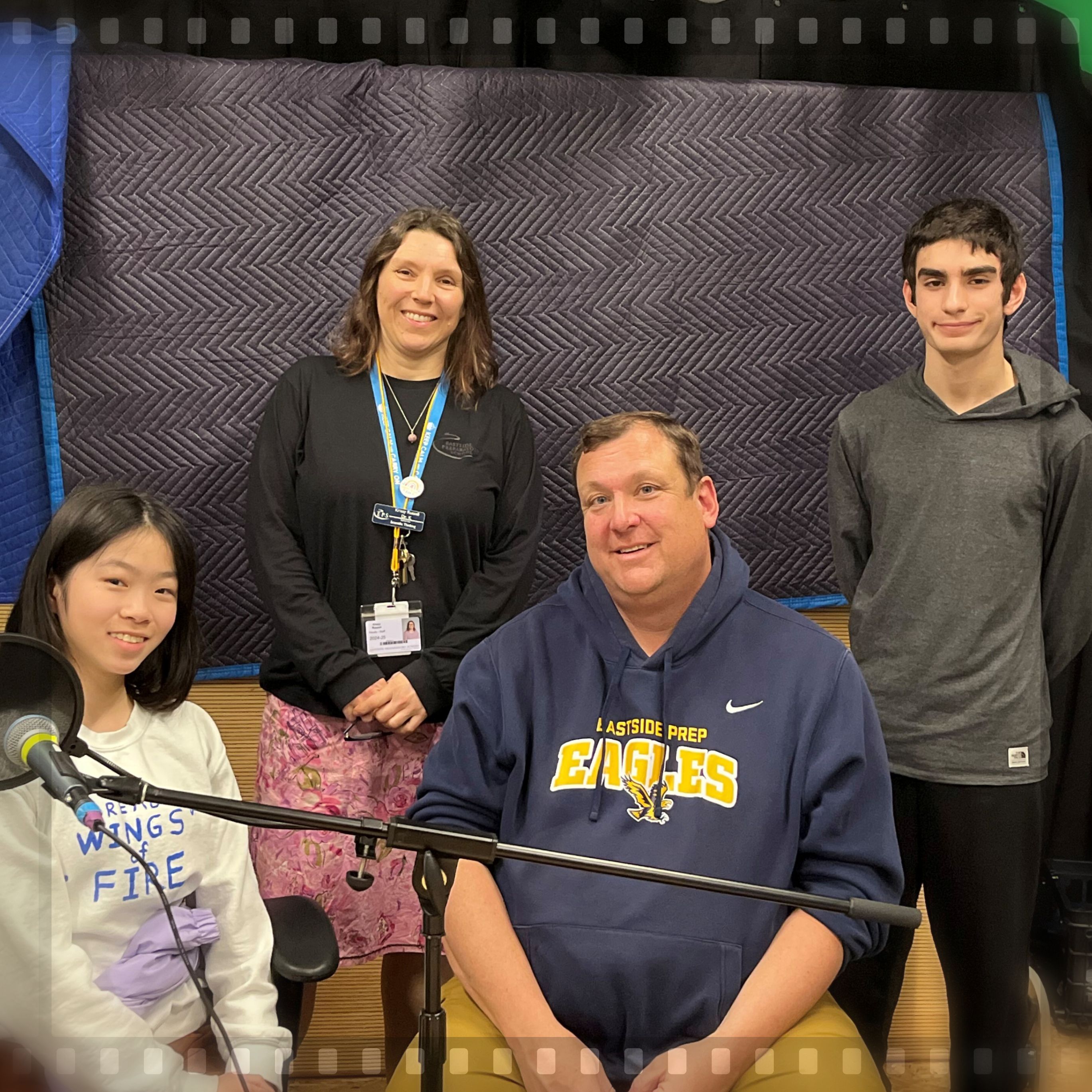Episode Transcript
[00:00:06] Speaker A: Welcome to insightful questions, the podcast that's all about getting to know Eastside Prep's new head of school, Sam Uswak.
We're diving into his vision and bringing together voices from all around eps in cool monthly chats.
Get ready to dig deep into what leadership and community really means. Mean you're tuned into insightful questions.
Hello. I'm Max Sheffield, and I graduated from EPS in the class of 2014, and I'm joined here with Sam, the man of the hour. Hello.
[00:00:41] Speaker B: How are we doing, Max?
[00:00:43] Speaker A: We're doing great.
[00:00:44] Speaker B: It's so good to have you here.
[00:00:46] Speaker A: It's great to be here. It's very cool studio. First time in this room, too, which is very fun.
[00:00:52] Speaker B: Yeah, no. So we thought that this podcast would be a neat way to just kind of share what we're thinking about school and how the school is moving forward. For me, back in the day, way back in the day, I was the business manager of my college radio station. Started off, my then girlfriend, now wife was the general manager of the radio station. And we'd pump out college radio, a whopping 390 watts, which meant a whopping 17 people probably listened to the station, but that was in Harrisonburg, Virginia. And, yeah, super creative and super fun.
[00:01:33] Speaker A: Nice. And I'm really honored, as I said before, to be the first alumni to come back and get to interview you really means a lot, especially because I felt we always had a great chemistry back and forth from that first time we met through a series of backpacking trips that we went on together all the way through my time at Eastside Prep and the times I've come back for coaching and various activities I do here.
[00:02:06] Speaker B: Yeah, no, I think it's been great that we've been able to keep in touch because we did have those connections over the years when you were a student. But also, I think you're a great model for others where people can see that you're part of Eastside Prep for life.
I don't know if everyone thinks about their high school in the same way that I hope our alumni think about this upper school and this experience in east side prep because you've coached and you come for different events, and we have alumni on our board of trustees, and you're a great resource in terms of a especially older alumni such as yourself.
A real great resource in terms of being reminded of why the school started and how we got here today, but also hearing about what's new out there, what's new in the working world, what's new in colleges and universities that can help Eastside prep remain on the edge of educational experience.
So, Max, remind me what year you graduated. It was 2014.
[00:03:20] Speaker A: It was 2014. That's right. And I graduated, and I went to Whitman College, graduated from there, and I was a biomajor of the computer science minor in 2018. Since then, I've been working at adaptive biotechnologies, where I'm currently a software product manager and critical to this podcast. I've been coaching here at Eastside Prep. I mainly coach the girls ultimate frisbee team, but I've also worked with the middle school and boys teams.
[00:03:49] Speaker B: Oh, that's fantastic.
I think I ran into you over a winter break on Capitol Hill at a restaurant, and we said hi, and we chatted, and then I think you were with Steve Benilo, and I said to you guys, hey, have a good break. And you were like, we're going back to work.
[00:04:12] Speaker A: Yeah, it's a tough reality, us working folk outside of the education space that's happened. I think every single time there's a spring break, a winter break, or a summer break, my players will ask, well, what are you going to do over break? Are you going to coach any summer camps? And I'll be like, yeah, I'm working eight to five.
That's where I came from before this, in fact.
[00:04:41] Speaker B: Exactly.
[00:04:43] Speaker A: Yeah, that was over in East Lake and Steven Bello and been, Steven and I, both lifers. We were so excited when we saw you walk in.
We went on those backpacking trips together. Big fans of the Uzwac. So it was really fun for us to see you.
[00:05:02] Speaker B: We should talk about that backpack trip. So I believe it was my second year, so summer 2010, and you would have been going into upper school, and we did this fantastic five day loop around in spider gap and the glacier peak wilderness. Right?
[00:05:21] Speaker A: Yeah, multi days, strenuous, up downhills, through the snow, through the rain.
[00:05:30] Speaker B: Yeah. I do remember when we got to spider gap, which was the high point, we didn't know what the conditions were like on the other side, and we were just sort of like. And the clouds came in and the rain came in, but, hey, we just kind of kept going. And that was a great trip.
[00:05:48] Speaker A: Yeah, it was a great time. And it's one of those really unique experiences I felt that we were able to have here at aps, where you're trudging through the snow with your teachers, eating the same food, sleeping on the ground.
It's really bonding. It breaks the whole classroom setting because you're all out there together, relatively doing the same thing.
[00:06:14] Speaker B: Absolutely. Yeah. And in it together.
When you're out there in the wilderness as a team, everyone's helping each other out, and so I really appreciate that dynamic.
[00:06:27] Speaker A: Yeah. And you really exercise some great patience, too. As we were singing, I think, lonely Islands, Captain Jack Sparrow on repeat, over and over and over and over.
[00:06:42] Speaker B: I think that's when we were like, hey, we're going to try something new. Let's do the silent walk.
[00:06:46] Speaker A: Yeah.
[00:06:47] Speaker B: So for an hour, we're going to spread out on the trail and just not make any noise and listen to.
[00:06:51] Speaker A: Nature a good time. I think that's one of the really special things about eps, too, were those relationships we're able to build outside of the classroom with our teachers.
And I was really curious, as you transition from teaching in a classroom setting to being involved with the leadership and running a school, how do you still find time to build those connections individually with each student?
[00:07:16] Speaker B: It's really important, and honestly, it's something moving into this new role of head of school I've been thinking about almost every day, because it is a very different role and there's a lot of behind the scenes work that is not directly student or faculty staff facing. So what that means is I have to be really thoughtful in how I plan my time, how I create connection. I try to bribe kids to come say hi to my office with jelly beans and cliff bars because the fourth floor office is a little kind of out of their day to day paths, but also sometimes it's just being visible during a passing period and certainly drop off and pick up. And one of the fun things we do here that Terry started is we'll get a group of faculty and staff together. We'll go watch a game or go watch a production and know, have some dinner together and just being really intentional about those opportunities and just realizing how important it is. I mean, at the end of the day, my job is to ensure that what's happening between kids and adults is the best experience possible, whether that's in the classroom, on the field, on the water, in the theater, on the stage. I'm going to list all the things and the robotics cord everywhere.
But you have to do that.
It's important to understand where kids are and what's going on.
[00:08:53] Speaker A: Yeah. And that was actually one of the things from your first podcast that I really related to, where you mentioned it's okay to enjoy school and your example, there was all the after school activities that you participated in that were a big part of why you enjoyed going to school, how you got what you needed out of it and how you thrived. And that was something I really relate to as someone who did every single sport I could.
Multiple clubs really thrived in the culture that eastside prep fostered. And when I am coaching or when I'm watching one of the other teams here, you're a constant person out there.
Are there other examples, say, from the clubs or initiatives that kids have started here that you've really been proud of and seen the kind of like that young use whack?
[00:09:47] Speaker B: Yeah, there's so many. I mean, I think one of the most important things we can do for kids is help them to understand how to, once they have the idea, once an idea is born, how do I bring it to life? So from idea to reality, and usually there's a lot more steps than folks realize, because they just haven't experienced it before. So I see it as our job to help set up this pathway towards success by asking good questions, helping folks understand the complexities of situations. I'll give you a very recent example.
We are actually about to install a salmon tank where we will take salmon eggs and we will raise fry, and we will release them into a local stream into Lake Washington. And this has been an idea that's been bouncing around since 2018.
We have a couple of students in our marine biology club who are so excited about this. They volunteer at the aquarium. They're doing this club, and they see that this is so vision appropriate. This is so like, let's make a better world.
But how do they get it done? How do they navigate through the institution? How do they realize that dream? And I see it as our job to help facilitate that. And so we met. They had a budget, they had a timeline, they had a location, they had a plan for maintenance and for taking care of things. And I was able to say, okay, we can do this. After meeting with folks in facilities and our middle school head, Sarah Pedan, to make sure that from the school perspective, their idea was going to work.
That success lets them know that when they get to college or when they're in work or when they're out in life, they can have an impact. They can see an idea become alive. And the sooner we can help kids with that, the sooner you can be doing that.
[00:12:03] Speaker A: I think that really embodies what preparatory means to me, and it's something that I see every day at work. Those are the people I want to work with that can make things happen. Right. You can follow a test, you can do your work assignment, but creating that environment, that's awesome.
That's how you get things done. That's how you innovate.
[00:12:24] Speaker B: Absolutely. Yeah. Innovation doesn't come from compliance.
Back to the core values.
[00:12:31] Speaker A: You know, Sam, something that's really interesting is how our core values at Eastside prep reflect the core values of my current company, adaptive biotech.
The core values of eps. Do you want to lead them off?
[00:12:44] Speaker B: I'll do those.
[00:12:45] Speaker A: Yeah. Hit me with the tally.
[00:12:47] Speaker B: I'll hit you. Okay. We'll do the tally. Think critically. Act responsibly, lead compassionately, innovate wisely.
[00:12:55] Speaker A: Now, get this. Here's adaptive's core values. Make it happen. Follow true north. Innovate fearlessly, work together.
[00:13:04] Speaker B: Whoa.
[00:13:06] Speaker A: Those values from eps just connect perfectly to know it's a little bit different. Right. You'll have work together, which takes into account both thinking critically and leading compassionately. But innovate fearlessly and innovate wisely. I love those two.
[00:13:24] Speaker B: Yes, absolutely. And follow true.
What?
To me, you have to think about what your true north is. What's your north star? But then you have a responsibility to get there.
You have a responsibility to stay on target.
[00:13:40] Speaker A: Yeah.
[00:13:40] Speaker B: Oh, man. That is amazing.
[00:13:42] Speaker A: And that's a perfect example, too, of how EPS helps kids make it happen, give them the environment to make that happen, which.
Yeah, that's what you want.
[00:13:55] Speaker B: So, I got a question for you, if you don't mind.
Way back in the day, what was it about EPS that resonated with you? Max?
[00:14:09] Speaker A: What about EPS resonated with me? Well, back in my day, which I say a lot around here as a lot of the buildings have changed, but back in my day, it was a much smaller campus. But one of the core things that I still see to this day is the community and the teachers, the teachers, the staff, those all really define my experience here. Important that I'm saying staff, too, because I actually came back and worked two summers after senior year and after freshmen in college with the facilities team, just doing general things, building the school. A lot of these new buildings as they were going up, too. And it's been those connections and the relationships that I founded there that really built the importance of eps into my life and why I keep coming back to coach, to do interviews like this, and to hang out and say hi to you at coffee in Eastlake.
[00:15:07] Speaker B: So, flash forward to today, and one of the things I'm most excited about in this role is maintaining connection with alumni.
And so what advice do you have for me in terms of, as I start my journey as head of school, what are the things that are really important to you that persist here at.
[00:15:36] Speaker A: It. Well, as I was just mentioning, it's those teacher student relationships. When I walked in here, I was met by Kelly Fox who said, max. And then Miss lures walked by and goes, Max. And it's those caring teachers. You get them with the alumni, it's like they never left. They're going to feel the same relationship, the peer to peer that they had all the time here.
And one of the fun things that's been coming up in the past couple of years for me with the ultimate program is that we have enough alumni for alumni games. Yeah, and alumni are all coming out to our state finals. The alumni are coming out for nationals, too, and just having little ad hoc games, getting to know the team, know the people, it just helps build that community and a community for supporting students as they graduate, too, that they know they can always come back to and lean on.
[00:16:36] Speaker B: That's great. I hope all the alumni also know that you get free lunch for life, too.
[00:16:41] Speaker A: That is exactly what we're doing after this. Yeah, I did not forget that. And our lunches are good here, so.
[00:16:49] Speaker B: Unfortunately, we probably need to wrap it up, Max. But before we do, one more question. Do you have a favorite memory from your time at EpS?
[00:16:58] Speaker A: Well, I guess one of my favorite memories is something I've brought back up to you a couple of times now. And it was when, on one of these backpacking trips, I spent maybe an hour or a couple of hours building up this joke and really running on this joke. And this was, as you mentioned, 2010, when anti jokes were really funny. And this joke just did not have a punchline. It just ended. And when that happened, you were crushed, you were upset, and I was losing it. I was laughing. It was a great time. And it had to do with these plastic parrots. And so that next year, I decorated your office with some plastic parrots. And then when I heard you were ahead of school, I organized with Mr. Walzer to set up some plastic parrots in your new office because I was so excited to hear that you were going to be the head of school because I felt like that is somewhere where you're just going to thrive.
[00:18:00] Speaker B: Oh, man. I appreciate that. I did not appreciate the joke at the time. I believe you saw the look on my face, but I still have those parrots.
[00:18:10] Speaker A: It was like the end of the. It was like the final stretch of the journey, too.
[00:18:16] Speaker B: Exactly. Max, thank you so much for your time, and thank you for everything you're doing for EPS. It's so great to chat.
[00:18:22] Speaker A: Thanks for having me. This was fabulous. It's great to talk to you.
To gain more insights, check out the EPS weekly news each Friday.


